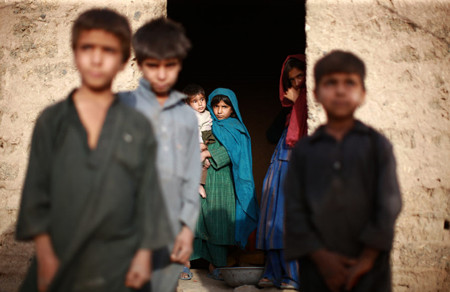by Iason Athanasiadis
A third of a million desperate people once lived in Maslakh, a camp of wind-blown mud brick houses erected upon a brittle lunar landscape in western Afghanistan. Ten years after the US-led invasion, the population of internally displaced waxes and wanes, subject to the whims of the country’s quarreling political factions.

The children of a preacher from Kandahar stand around their mud-brick dwelling in Maslakh, western Afghanistan.
The Taliban controlled the camp until they were ousted in late 2001. As the Tajik victors of the so-called Northern Alliance reclaimed Herat under American tutelage, they unleashed a wave of persecution against the Pashtuns, the largest ethnic group in Afghanistan, which also forms the Taliban’s main base of support. Sensing the end of their regime, Taliban foot soldiers shouldered their weapons and disappeared into the camp’s anonymity from comfortably appointed villas in nearby Herat.
Today, the tensions continue at Maslakh, which translates as “slaughterhouse” in Dari.
“The Pashtuns fixed a name for themselves -- the Taliban -- and the Tajiks call themselves the Northern Alliance, but what this really is, is a war between rival communities that has been given a different name,” Mullah Kareem, a former Taliban commander in Herat Province who laid down his weapons as part of a reconciliation program, told EurasiaNet.org.
Vindictive in their victory, the Tajiks arrested many they suspected to be Taliban and mistreated or subjected them to random or pre-planned acts of revenge, Kareem says. The numbers of Pashtuns in Maslakh swelled, as did the number of robbers that entered the camp nightly to steal the refugees’ scarce goods and frighten the women. As neighboring Iran (which along with Pakistan shouldered the majority of the Afghan exodus during the past thirty years of war) began systematically ejecting refugees, thousands more poured into Maslakh, putting further pressure on its already inadequate infrastructure.
Today, the on-going insurgency and a season of famine in the north have swollen the numbers of internally displaced. Malnourishment afflicts the children, who stare with eyes sharpened by hunger. Dozens die every month from diseases like hepatitis, malaria, tuberculosis and respiratory tract infections. At the peak of the camp’s troubles in 2002, up to a hundred people were dying every day of exposure and starvation. Their bodies are laid to rest, far from their birthplaces, in cemeteries creeping over the desert plain of Sakh Soleiman.
“I always judge everything by what I have seen in Africa,” says Ian Lethbridge, executive director of Feed the Children, a charity. “And this is on the scale of Africa. I was shocked at the living conditions of the new arrivals.”
Khedmat is eleven years old. A slight figure lingering at a police roadblock on the main highway connecting Iran to Herat, squatting between trucks laden with produce, he describes losing both his parents. He is the only boy among five siblings. Unskilled and illiterate, he heads out every morning from the narrow crypt he inhabits with his sisters, hoping to scrounge enough change from passing motorists to eat by nightfall.
The men hitch lifts into nearby Herat to work odd jobs or toil away for pennies at a local brick kiln. Children trek three hours into the foothills to scavenge for material to burn. Others take advantage of the nearby Iranian border and their knowledge of the territory to smuggle goods along the mountain paths. Exposed to the desert, sharp winds scour the camp day and night. Temperatures soar at sunrise and plunge numbingly just before the sun sets.
“So far, the only solution offered to displacement has been return -- but few are ready to take that offer,” says Nassim Majidi, a consultant on Afghan migration and doctoral candidate at Oxford University. “The situation is one of deadlock.”
Editor's Note: Iason Athanasiadis is an Istanbul-based freelance journalist.



